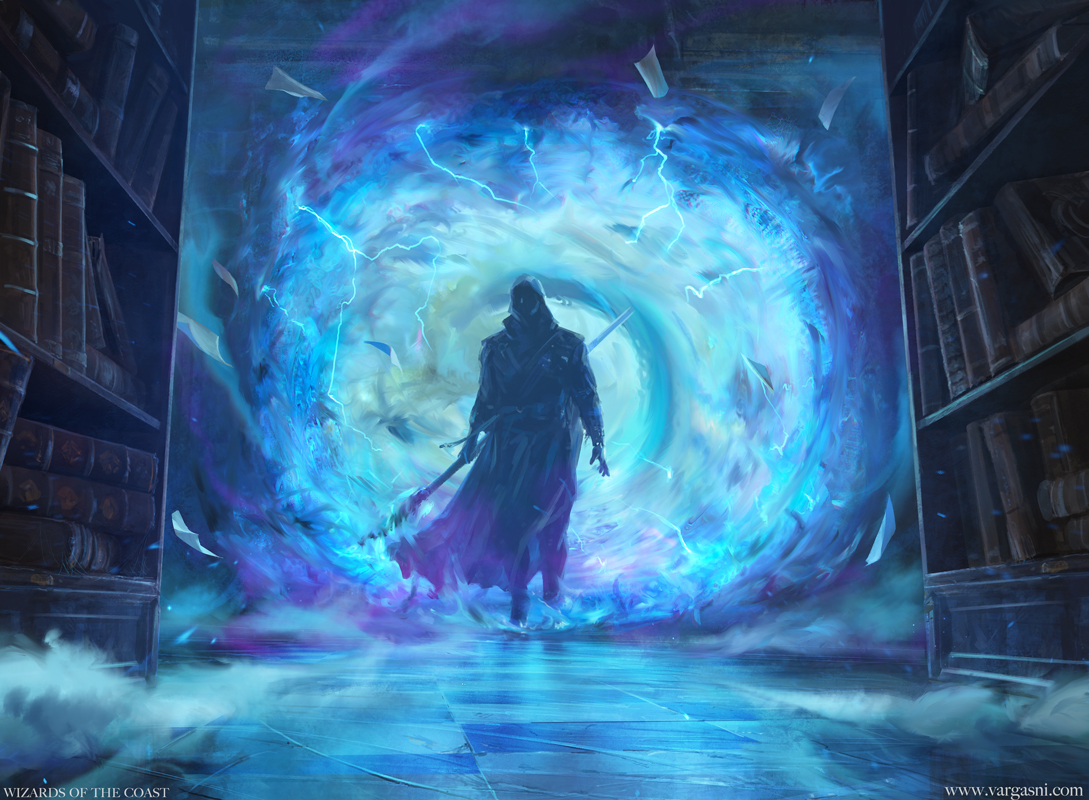

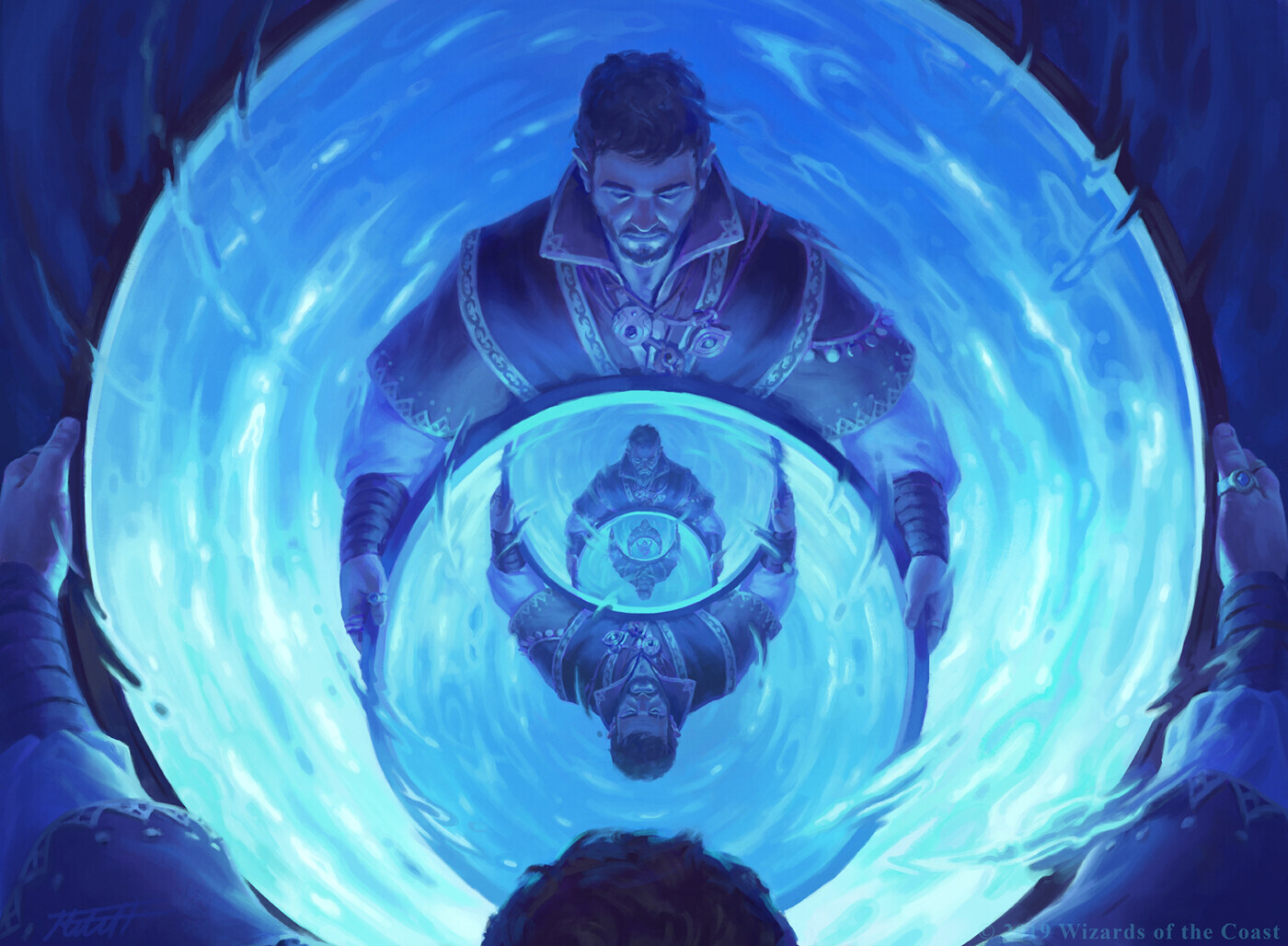


Artificer: Rift Maker
The Rift Maker is able to use their tinkering abilities to create and manipulate gaps in space. A Rift Maker can pull out objects from other dimensions and create small localised portals to extend the reach of their attacks.
Tools of the Trade
3rd-level Rift Maker feature
You gain proficiency with cartographer’s tools. If you already have this tool proficiency, you gain proficiency with one other type of artisan's tools of your choice.
Rift Maker Spells
3rd-level Rift Maker feature
You always have certain spells prepared after you reach particular levels in this class, as shown in the Rift Maker Spells table. These spells count as artificer spells for you, but they don't count against the number of artificer spells you prepare.
Rift Maker Spells
| Artificer Level | Spell |
|---|---|
| 3rd | chaos bolt, tenser's floating disk |
| 5th | mirror image, misty step |
| 9th | haste, thunder step |
| 13th | banishment, dimension door |
| 17th | passwall, wall of force |
Portal Strike
3rd-level Rift Maker feature
You create temporary openings in space to take your enemy unawares. When you make an attack with a magic weapon while holding cartographer’s tools, or you cast a spell that requires you to make an attack roll using your cartographer’s tools as the spellcasting focus, you gain additional benefits, as shown below:
- You can use your Intelligence modifier, instead of your Strength or Dexterity modifier, for the attack and damage rolls for a weapon attack.
- When making a melee attack, you can do so against a target that is up to 30 feet away from you.
- When making a ranged attack, you ignore half and three-quarters cover.
Rift Armory
3rd-level Rift Maker feature
You use your planar abilities to open a portal and pull out objects from other realities. While you’re holding cartographer’s tools, you can use an action to conjure one nonmagical item of your choice. An item created in this way appears in your hand, or in an unoccupied space you can see within 10 feet of you that is on a surface or in a liquid that can support it. The gp value of the item can't be more than 10 times your artificer level, and the item must be Medium or smaller. The item shimmers with minute planar energy and may sport subtle variations that make it different from other items you would find in your world. For examples of items you can create, see chapter 5, “Equipment”, of the Player's Handbook.
Once you create an item with this feature, you can't do so again until you finish a long rest. You can have only one item created by this feature at a time; if you use this action and already have an item from this feature, the first one immediately vanishes. Otherwise, the item lasts indefinitely or until you die.
The size of the item you can create with this feature increases by one size category when you reach 6th level (Large) and 15th level (Huge).
Temporal Blast
5th-level Rift Maker feature
You use the space between planes to amplify your attacks. Whenever you make an attack using your Portal Strike feature, you can change the damage type to force damage. If you do, you roll a d8 and add the number rolled to one damage roll of the attack.
If you make this attack immediately after teleporting from another space or appearing from a different plane of existence, the bonus damage increases to 2d8.
Flickering Jaunt
9th-level Rift Maker feature
You are able to create localised instabilities, gaining the following benefits:
- You can cast blink without expending a spell slot and without preparing the spell, provided you use cartographer’s tools as the spellcasting focus. You can do so a number of times equal to your Intelligence modifier (minimum of once), and you regain all expended uses when you finish a long rest.
- When you or a creature you can see within 90 feet of you is damaged by an attack or harmful spell, you can use your reaction to teleport the target to an unoccupied space that you can see within 30 feet of you (as long as the target is willing). You must have cartographer’s tools in your hand to use this reaction.
Planar Pull
15th-level Rift Maker feature
You have a better feel for manipulating spatial rifts and what you want to conjure from them, gaining the following benefits:
- You can use your Rift Armory feature to conjure a magic item. You choose from the Replicable Items table from the Replicate Magic Items artificer infusion, ignoring gp cost.
- The bonus damage from your Temporal Blast feature increases to 2d8 and 3d8 damage, respectively.
- You can cast plane shift without expending a spell slot or material components, provided you use cartographer’s tools as the spellcasting focus. Once you do so, you must finish a long rest before you can cast it again.
Barbarian: Path of Graviturgy
Barbarians who travel the Path of Graviturgy are able to manipulate the forces of what drives and repels objects. They might have received their abilities after experiencing a harsh planar event or after a moment of intense magical stress. Whatever the reason, the powers of graviturgy are now entwined with their rage.
Force Propulsion
3rd-level Path of Graviturgy feature
You use your graviturgic abilities to empower your attacks. Once on each of your turns, immediately after you hit a target with a melee weapon attack, you can deal an extra 1d6 force damage.
Gravity Well
6th-level Path of Graviturgy feature
Your rage distorts the space around you. While raging, the area around you in a 10-foot radius becomes difficult terrain. This area is centred on you and moves with you. You can choose any number of creatures to be unaffected.
In addition, you can use a bonus action to force a creature you can see in this area to succeed on a Strength saving throw (DC equal to 8 + your proficiency bonus + your Constitution modifier) or be moved 5 feet toward you or away from you. A creature can willingly fail this save.
Density Adjustment
10th-level Path of Graviturgy feature
You have gained finer control over your own gravity. You can cast either feather fall and jump on yourself without expending a spell slot or using any material components.
You can use this feature a number of times equal to your proficiency bonus, and you regain all expended uses when you finish a long rest.
Strong Force
14th-level Path of Graviturgy feature
You are able to trap creatures in your gravity. While you’re raging and you hit a creature with a melee weapon attack, you can force it to make a Strength saving throw (DC equal to 8 + your proficiency bonus + your Constitution modifier), with disadvantage if it has already failed its saving throw against your Gravity Well feature.
On a failed save, the target takes 2d6 force damage and is restrained until the end of its next turn. On a successful save, it takes half damage and suffers no other effects. You can force a creature to make this saving throw only once on each of your turns.
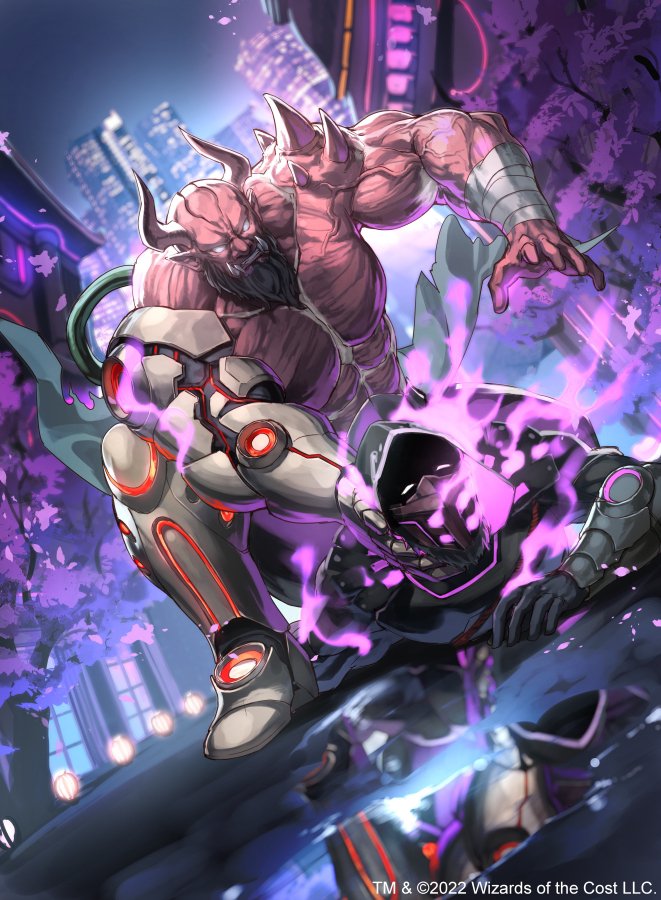

Bard: College of Heroes
Inspiring stories and heroic tales are aplenty, but it is a bard’s skill in regaling such fantastical tales that make them truly come alive and rouse audiences to action. So finely attuned they are to the lore and legends of heroes past, they can summon their essence to aid them. Creativity is best taken from its source, and who better to talk to than the actual legends of old?
Ancient Hero
3rd-level College of Heroes feature
As a member of this college, you learn to summon the essence of a hero to accompany you on your travels. As an action, you can summon an ancient hero from the distant past. It appears in an unoccupied space of your choice within 30 feet of you.
The hero is friendly to you and your companions, and it obeys your commands. See this creature's game statistics in the Ancient Hero stat block, which uses your proficiency bonus (PB) in several places. When you summon the hero, choose the type of spirit you summon: Healer, Mage, or Warrior. Your choice of spirit determines certain traits in its stat block.
In combat, the hero shares your initiative count, but it takes its turn immediately after yours. It can move and use its reaction on its own, but the only action it takes on its turn is the Dodge action, unless you take a bonus action on your turn to command it to take another action. That action can be one in its stat block or some other action. If you are incapacitated, the hero can take any action of its choice, not just Dodge.
The hero remains until it is reduced to 0 hit points, until you use this feature to summon the hero again, or until you die. Anything the hero was wearing or carrying that it didn’t have when it was already summoned is left behind when it vanishes.
Once you summon the hero, you can't do so again until you finish a long rest, unless you expend a use of Bardic Inspiration to summon it. You regain this use of Bardic Inspiration when you finish a long rest.
Heroic Recital
3rd-level College of Heroes feature
Your stories regale lofty ideals. You learn the heroism spell if you don’t already know it, and it doesn’t count against the number of bard spells you know. You can cast this spell without expending a spell slot a number of times equal to your Charisma modifier (minimum of once), and you regain spent uses at the end of a long rest.
Ancient Hero
Medium Humanoid
- Armor Class 13 (studded leather armour) + 2 (Warrior only)
- Hit Points 5 + five times your bard level (the hero has a number of Hit Dice [d8s] equal to your bard level)
- Speed 30ft.
STR DEX CON INT WIS CHA 15 (+2) 12 (+1) 15 (+2) 14 (+2) 14 (+2) 11 (+0)
- Skills History +2 plus PB; Arcana +2 plus PB, Nature +2 plus PB (Mage only)
- Condition Immunities exhaustion
- Senses darkvision 60ft., passive Perception 12
- Languages speaks and understands the languages you speak
- Challenge — Proficiency Bonus equals your bonus
Ancient Fortitude. If damage reduces the hero to 0 hit points, it can make a Constitution saving throw with a DC of 10 or 5 + the damage taken (whichever is higher), unless the damage is from a critical hit. On a success, the hero drops to 1 hit point instead.
Actions
Fire Bolt (Mage Only). Ranged Spell Attack: your spell attack modifier to hit, range 120 ft., one target. Hit: 1d10 fire damage. A flammable object hit by this spell ignites if it isn't being worn or carried.
Innate Healing (3/Day; Healer Only). The hero chooses one creature it can see within 30 feet of it to regain 1d4 + PB hit points. This has no effect on an Undead or Construct.
Spirit Sword (Warrior or Healer Only). Melee Weapon Attack: your spell attack modifier to hit, reach 5 ft., one target you can see. Hit: 1d6 + PB force damage.
Reactions
Protection (Warrior Only). The hero imposes disadvantage on the attack roll of one creature it can see that is within 5 feet of it, provided the attack roll is against a creature other than itself.
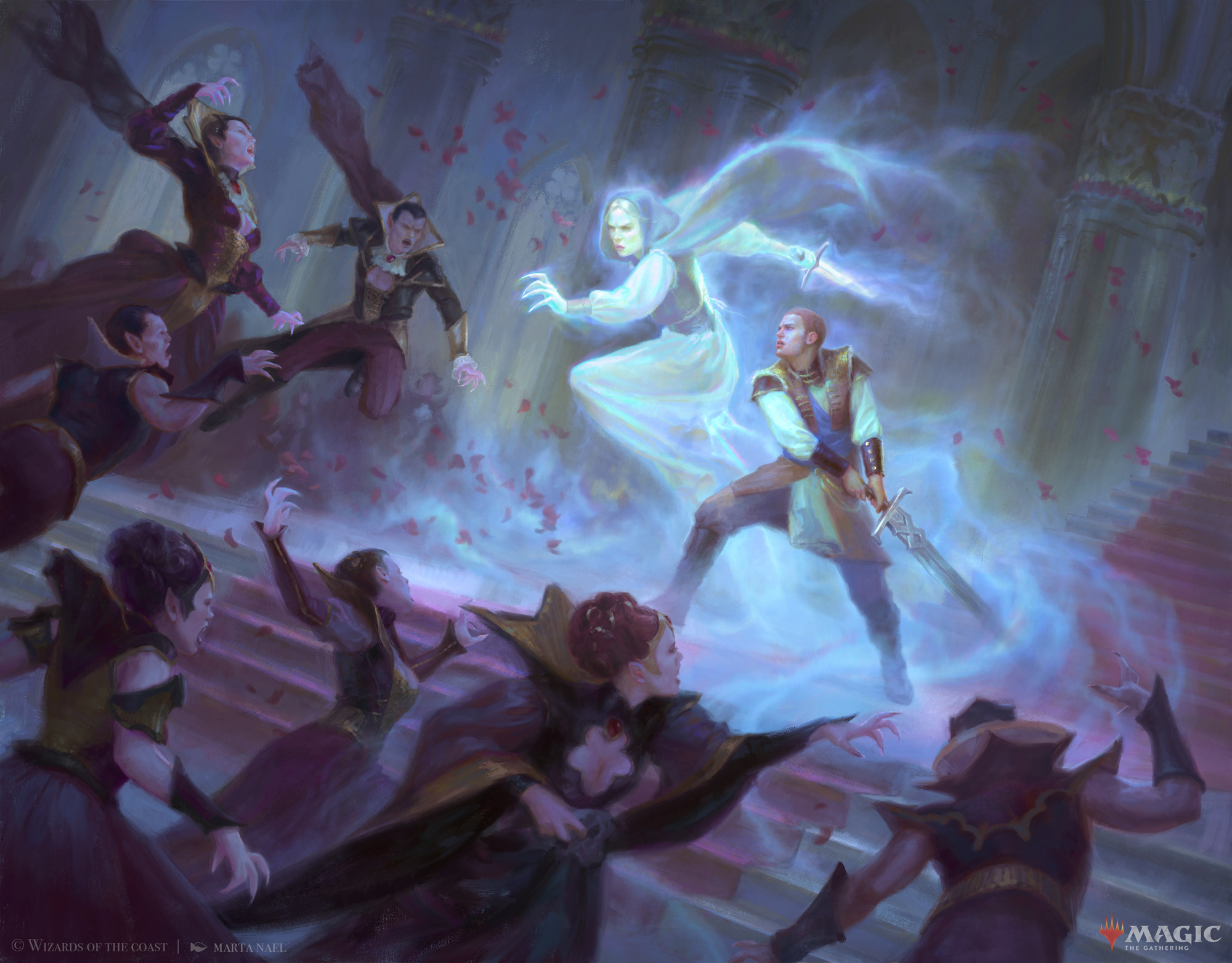


Summoning A Hero
You may want to discuss the potential ramifications of the ancient hero being summoned with your DM. Who was this hero and what deeds did they do in life? Which plane were they laid to rest? Did they end up among the adored figures in Elysium? Damned in the Nine Hells? Or subjected to eternal chaos in Limbo?
For the hero, it could have been centuries since they last saw the lands you now walk. They will have their own thoughts and feelings regarding being brought back, how their home has changed, as well as the reason as to why you are adventuring.
Keeping an ancient spirit tethered to the Material Plane takes a lot of magic. As such, the hero would only be able replicate a fascimile of the feats it once had in life. Your progression in this subclass represents your increased mastery of supplying the hero with magical energy so they can better fight.
Ancient Guidance
6th-level College of Heroes feature
The power of your tales strengthen the ancient hero summoned. When you use a bonus action to order the hero, you can also expend a use of Bardic Inspiration to give the hero additional benefits, depending on the type of hero summoned, that last until the start of your next turn.
- Healer. The next time the hero uses its Innate Healing on a creature, you roll a Bardic Inspiration die and the creature regains additional hit points equal to the number rolled. In addition, if the hero has no uses of Innate Healing remaining, it regains one use.
- Mage. The next time the hero makes a spell attack, its range is doubled. You also roll a Bardic Inspiration die and add the number rolled to its attack roll.
- Warrior. The hero’s speed increases by 10 feet. In addition, if the hero hits a creature with a weapon attack, you roll a Bardic Inspiration die. The hero deals force damage to a different target it can see within reach equal to the number rolled.
Exploits of the Hero
14th-level College of Heroes feature
Spending time with grand heroes of old has allowed you to pick up some of their techniques. While you have a hero summoned, you gain one of the following benefits depending on the type of hero. The benefits end when the hero is no longer present or if a different hero is summoned.
- Healer. Whenever you restore hit points to a creature, you can choose a different target you can see within 30 feet of you to regain half the number of hit points. You can’t choose an Undead or Construct.
- Mage. When you roll damage for a spell you cast, you gain a bonus to one damage roll of the spell equal to your Charisma modifier (minimum of +1).
- Warrior. You gain a bonus to your AC equal to your Charisma modifier (minimum of +1).
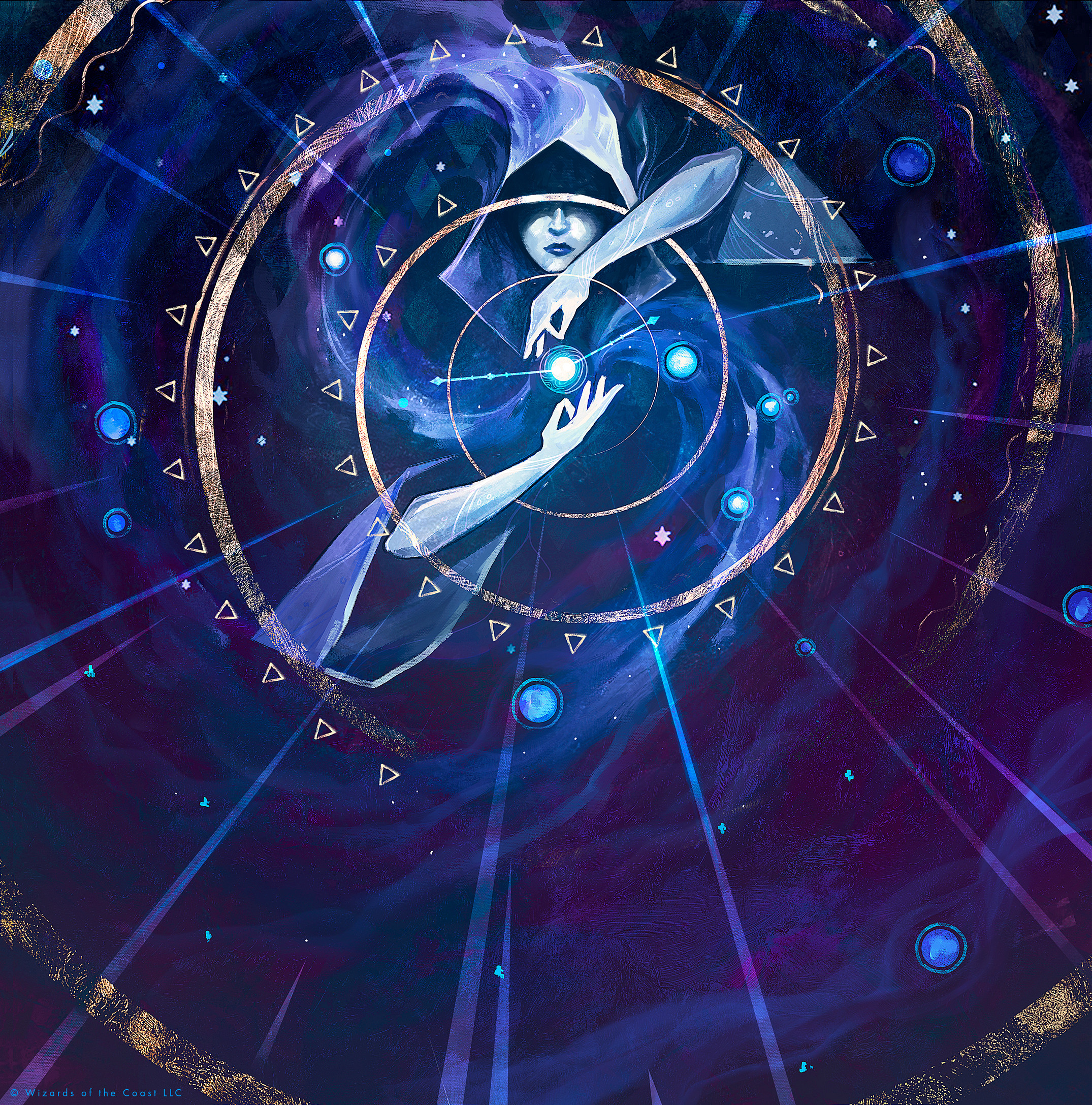


Cleric: Time Domain
Time is one of the most foundational cruxes of existence, and the gods that oversee this domain are some of the most uncompromising in their respective pantheons. These gods ensure that the flow of time continues onward for all other beings, whatever the cost. The Time Deities table contains some examples of gods associated with this domain.
Clerics of this domain vigilantly watch over the procession of time and take care of any anomalies that might disrupt this flow. Many of these threats are often extraplanar in nature. As such, these clerics hone themselves in fighting against them.
Time Deities
| Example Deity | Pantheon |
|---|---|
| Chronos | Greek |
| Labelas Enoreth | Elven |
| Primus | Forgotten Realms |
| Skuld | Norse |
Domain Spells
1st-level Time Domain feature
You gain domain spells at the cleric levels listed in the Time Domain Spells table. See the Divine Domain class feature for how domain spells work.
Time Domain Spells
| Cleric Level | Spell |
|---|---|
| 1st | alarm, bless |
| 3rd | darkvision, see invisibility |
| 5th | haste, slow |
| 7th | freedom of movement, staggering smite |
| 9th | banishing smite, steel wind strike |
Bonus Proficiencies
1st-level Time Domain feature
You gain proficiency with martial weapons and heavy armor.
Temporary Stoppage
1st-level Time Domain feature
You temporarily stop the flow of time around a creature. As an action, you can choose one creature that you can see within 30 feet of you to make a Constitution saving throw. On a failed save, that creature becomes incapacitated and has a speed of 0 until the start of your next turn.
Once you use this feature, you can’t use it again until the end of a short or long rest.
Channel Divinity: Snapshot in Time
2nd-level Time Domain feature
You can use your Channel Divinity to isolate and replicate a moment in time.
When a creature you can see within 30 feet of you makes an ability check, attack roll, or saving throw, you can use your reaction to note the number rolled. The next time that same creature attempts the same type of d20 test, you can use your reaction to force the target to succeed on a Charisma saving throw or be forced to use the number you noted for it. A creature can willingly fail this save.
You can only note down one rolled d20 to a creature at a time. If you note down a new number when you have already done so for the same creature, the previous number is erased. Any numbers noted down that haven’t been used by the end of your next long rest are automatically erased. Your Channel Divinity is expended only when you use your reaction to force the saving throw.
Change Order
6th-level Time Domain feature
Your powers with time allow you to alter a sequence of events. After all creatures make their initiative rolls, but before the first turn of combat, you can designate one creature you can see within 30 feet of you to start first or last in combat’s initiative order. In the round after, the initiative order reverts to its normal sequence.
Once you use this feature, you can’t use it again until you finish a long rest.
Divine Strikes
8th-level Time Domain feature
You gain the ability to infuse your weapon strikes with divine energy. Once on each of your turns when you hit a creature with a weapon attack, you can cause the attack to deal an extra 1d8 force damage. When you reach 14th level, the extra damage increases to 2d8.
Relativity Bubble
17th-level Time Domain feature
You are able to magically speed up time around a person. As an action, you can choose a creature within 30 feet of you to use its reaction to immediately take an extra turn. When you do, your turn immediately ends and you become incapacitated until the end of your next turn.
Once you use this feature, you can't do so again until you finish a long rest.
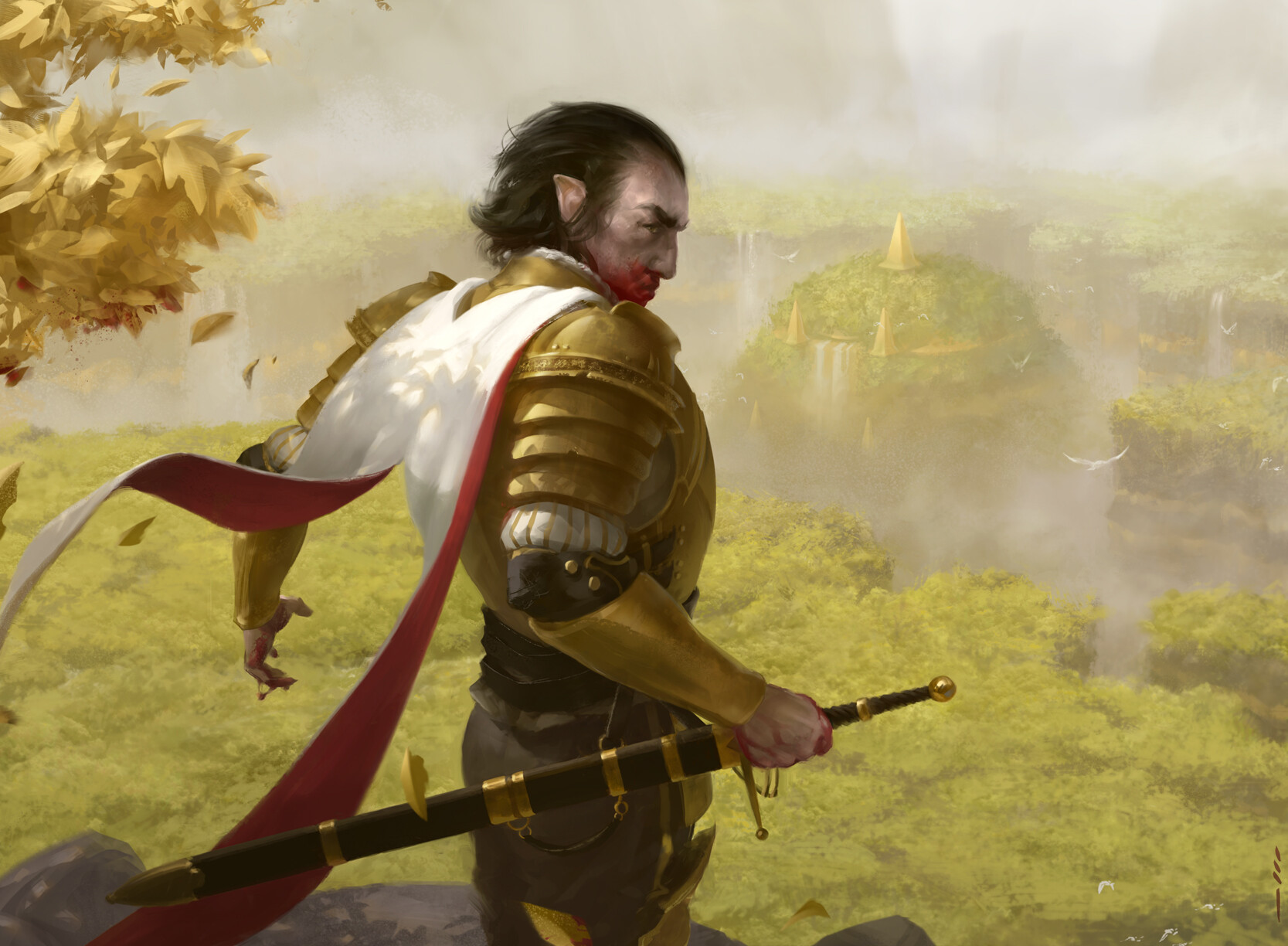


Druid: Circle of the Horizon
Druids of the Circle of the Horizon are the frontline guardians of life on the Material Plane, protecting them from otherworldly threats. Many of their foes include undead and aberrations, creatures that seek to spread their defiling influence. Some druids actively hunt such foes, others stand as bastions of nature, protecting the lush green forests and clear skies from anyone looking to taint its splendour.
Druids that belong to this circle are particularly close to the good-aligned inhabitants of the Feywild, with cooperation between them being a regular occurrence across the planes.
Extraplanar Guardian
2nd-level Circle of the Horizon feature
Fighting in different planes has made you adept in a variety of weapons. You gain proficiency in martial weapons and heavy armour, and you ignore the limitations for using weapons, armour, or shields made of metal. You also learn to speak, read, and write one Exotic Language of your choice.
Fey Transformation
2nd-level Circle of the Horizon feature
Your time spent on the border between planes has granted you the ability to change your current form. As a bonus action, you can expend a use of your Wild Shape to adopt a Fey form, rather than transforming into a Beast. Each form embodies a specific court of the Feywild; your choice grants you certain benefits while in the form.
While in this form, you become the Fey Creature Type, you are immune to being charmed, and you can use your Wisdom modifier for your attack and damage rolls with weapons you’re proficient in. You can maintain this form for up to 10 minutes. It ends early if you dismiss it (no action required), you die, or you use this feature again.
- Pixie. Your adopt a pixie's tricksy tendencies. As an action, you can magically turn invisible for up to 1 minute (as if you were concentrating on a spell). The effect ends early if you make an attack or cast a spell, or you change your form.
- Quickling. Your quickling form allows you to take to high speeds. You can take the Dash action as a bonus action. You can also add a bonus to your ability checks that use Dexterity equal to your Wisdom modifier (minimum of +1).
- Satyr. You draw on a satyr's revelry. As an action, you can force a creature you can see within 30 feet of you to make a Wisdom saving throw against your spell save DC. On a failed save, the target is charmed by you for 1 minute. The effect ends early if the target takes any damage, if it witnesses you attacking or damaging any of its allies, or if you change your form.
Extra Attack
6th-level Circle of the Horizon feature
You can attack twice, instead of once, whenever you take the Attack action on your turn. Moreover, you can cast one of your cantrips in place of one of those attacks
Fey Embrace
10th-level Circle of the Horizon feature
Your affinity with your Fey form has grown stronger. While transformed, your weapon attacks deal radiant damage. Your transformations also gain extra benefits, as shown below:
- Pixie. Your invisibility no longer ends if you make an attack or cast a spell. You must still concentrate to maintain the effect.
- Quickling. When you take the Attack action on your turn, you can make an additional weapon attack as a bonus action.
- Satyr. You have advantage on saving throws against spells, and magic can't put you to sleep.
Moreover, at the start of each of your turns while you're transformed, you can change your form's transformation.
Nature's Sanctuary
14th-level Circle of the Horizon feature
You can turn a lush environment into an imposing fortress. You always have the druid grove spell prepared. You can cast this spell once without expending a spell slot, and you must finish a long rest before you can cast the spell in this way again (you can still cast this spell using spell slots you have of the appropriate level).
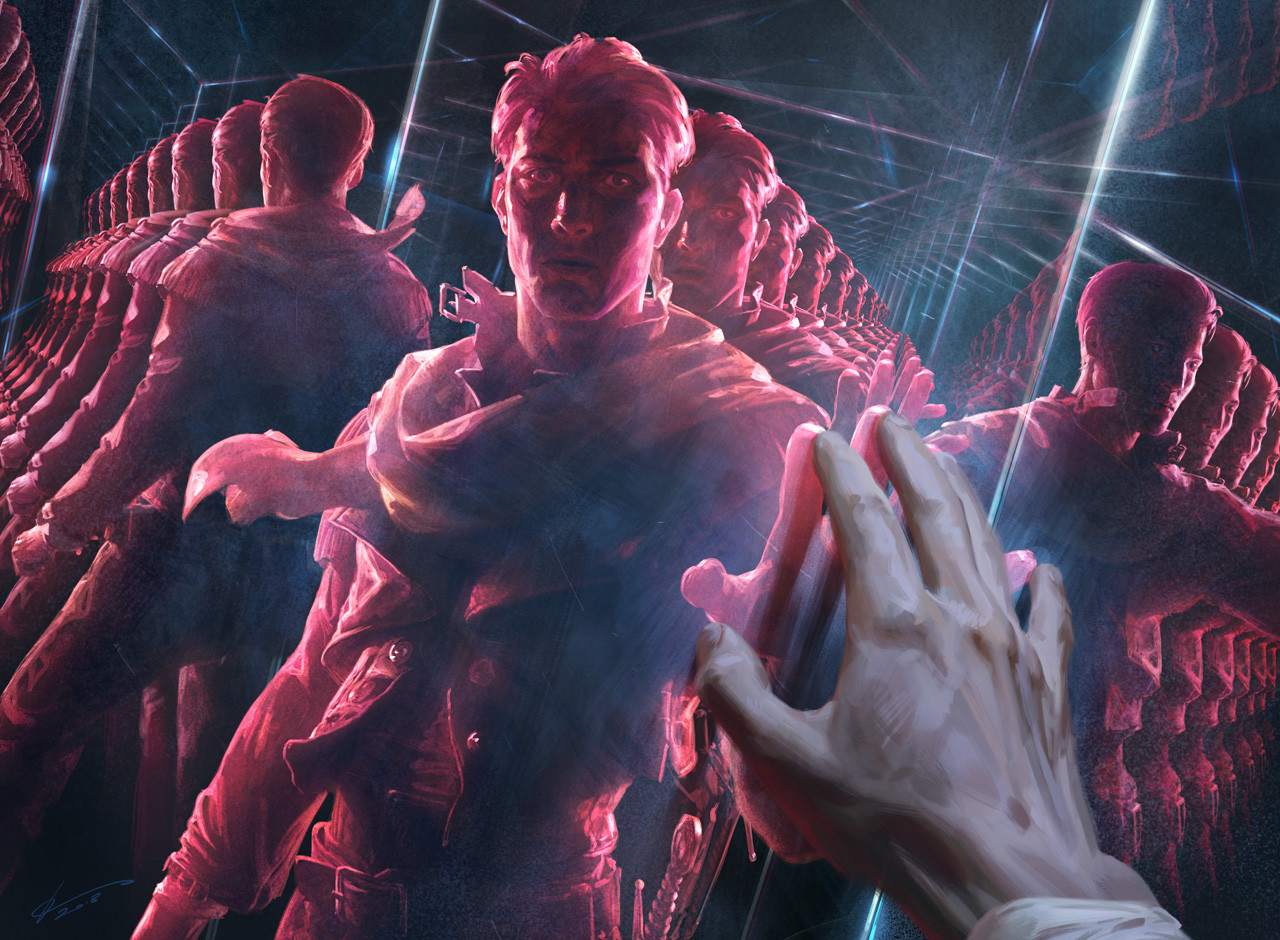


Fighter: Multiversal
The Multiversal is a clairvoyant fighter of quick wits. Their ability to peer into the near future and select the best outcome during battles make them almost untouchable to all but the most unpredictable and reckless of combatants.
Disciplined Mind
3rd-level Multiversal feature
Your efforts to train your mind have allowed you to better harness your knowledge. You can add half your proficiency bonus to any ability check that requires Intelligence, as long as it doesn't already include your proficiency bonus.
Opportune Strike
3rd-level Multiversal feature
Your short-term clairvoyance allows you to land hits more easily. Once per turn, you can add your Intelligence modifier to one attack or damage roll of a weapon attack you make (your choice; minimum of +1). You choose to do so after making the attack roll, but before knowing if the attack hits or misses.
When you reach 18th level, you can add your Intelligence modifier to both one attack roll and the proceeding damage roll of the weapon attack, if it hits.
Guiding Fortune
7th-level Multiversal feature
Your ability to see into multiple futures allows you aid your allies. When you or a creature you can see within 60 feet of you makes an ability check, attack roll, or saving throw, you can use your reaction to roll an additional d20 and have the creature choose which of the d20s to use.
You can use this feature a number of times equal to your Intelligence modifier (minimum of once), and you regain all expended uses when you finish a long rest.
Clairvoyant Dodge
10th-level Multiversal feature
You see where an enemy will strike and react accordingly. When a creature you can see makes an attack roll against you, you can use your reaction to impose disadvantage on the roll. If the attack still hits, you take half damage from the attack.
You can use this feature a number of times equal to your Intelligence modifier (minimum of once) and regain expended uses at the end of a long rest.
Oracular Avoidance
15th-level Multiversal feature
You use your future vision to sidestep out of danger. When you use your Indomitable feature, you can roll a d6 and add the number rolled to your saving throw. Whether you succeed or fail, you also subtract the damage taken by the same number rolled.
Time Surge
18th-level Multiversal feature
You manipulate the near future to such a fine degree that you can compress more actions in a set point in time. You gain an extra use of Action Surge. As normal, you can only use one instance on each of your turns.
Once you use this feature, you can’t do so again until the end of a long rest.
Seeing as a Multiversal
The Multiversal is only able to see possibilities of the immediate future. In an instant, the person sees all numerous possibilities as short clips that play out all at once. The visions make it easy to for one to be overwhelmed into inaction. As such, very few with the gift go on to master it.
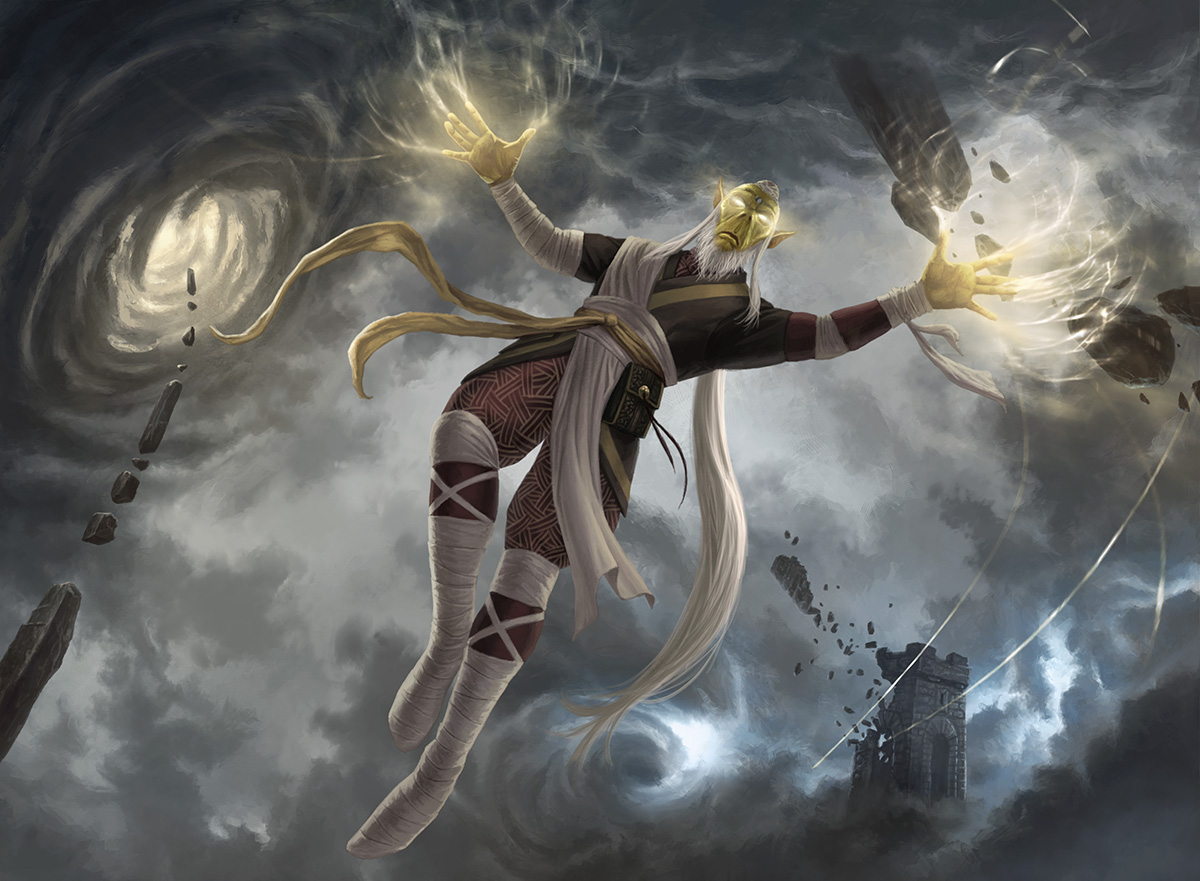


Monk: Way of Entropy
Monks trained in the Way of Entropy are able to use their ki to manipulate the deterioration of energy around living beings. This ability allows them to weaken their foes even further, or stave off their own injuries to allow them to fight at peak performance for longer.
Entropic Strike
3rd-level Way of Entropy feature
Your strikes insidiously drain a creature’s life force from their body. When you hit a creature with an unarmed strike, you can choose to roll two Martial Arts dice when dealing damage. However, the creature doesn’t take this damage until the start of your next turn. Additionally, when you deal damage in this way, the damage type becomes necrotic.
Sapping Touch
6th-level Way of Entropy feature
You gain the ability to greatly weaken your opponent’s physical condition. When you hit a creature using your Entropic Strike, you can spend 2 ki points to have the creature immediately take the damage roll from the hit. You can also force the creature to succeed on a Constitution saving throw against your ki save DC or suffer one level of exhaustion, up to a maximum of three levels.
Entropy Reversal
11th-level Way of Entropy feature
You are able to use your ki to reverse your own entropy by stealing another’s. Immediately after you take the Attack action on your turn, you can spend 4 ki points to cast the vampiric touch spell as a bonus action, using Wisdom as the spellcasting modifier. On subsequent turns, while you maintain your concentration, you can make the attack again on each of your turns as a bonus action.
You can spend additional ki points to cast vampiric touch as a higher-level spell. Each additional ki point you spend increases the spell's level by 1. The maximum number of ki points (4 plus any additional points) that you can spend on the spell equals half your monk level.
Energy Elongation
17th-level Way of Entropy feature
You are able to delay death using your ki. If you take damage that reduces you to 0 hit points and doesn't kill you outright, you can use your reaction and expend 5 ki points to delay falling unconscious, and you can immediately take an extra turn, interrupting the current turn. While you have 0 hit points during that extra turn, taking damage causes death saving throw failures as normal, and three death saving throw failures can still kill you. When the extra turn ends, you fall unconscious if you still have 0 hit points.
Once you use this feature, you can't use it again until you finish a long rest.
Paladin: Oath of the Beyond
The Oath of the Beyond swears fealty to entities that lie beyond the known planes of existence. These paladins represent the mortal arm of their influence as they seek to encroach and create a foothold in the Material Plane. To paladins who take this oath, they wholeheartedly believe that the intentions of these beings are benevolent and beneficial even though they don’t fully understand its reasons.
Tenets of the Beyond
A paladin who assumes the Oath of the Beyond does everything they can to spread the influence of their otherworldly benefactor.
Spread and Assimilate. The knowledge of the otherworldly entity and its benevolent deeds must be made known throughout all planes.
Embrace the Unknown. It is where your benefactor resides.
Defer to Their Wisdom. The wisdom of your patron is beyond your understanding, and as such must be followed whenever possible.
Oath Spells
3rd-level Oath of the Beyond feature
You gain oath spells at the paladin levels listed in the Oath of the Beyond Spells table. See the Sacred Oath class feature for how oath spells work.
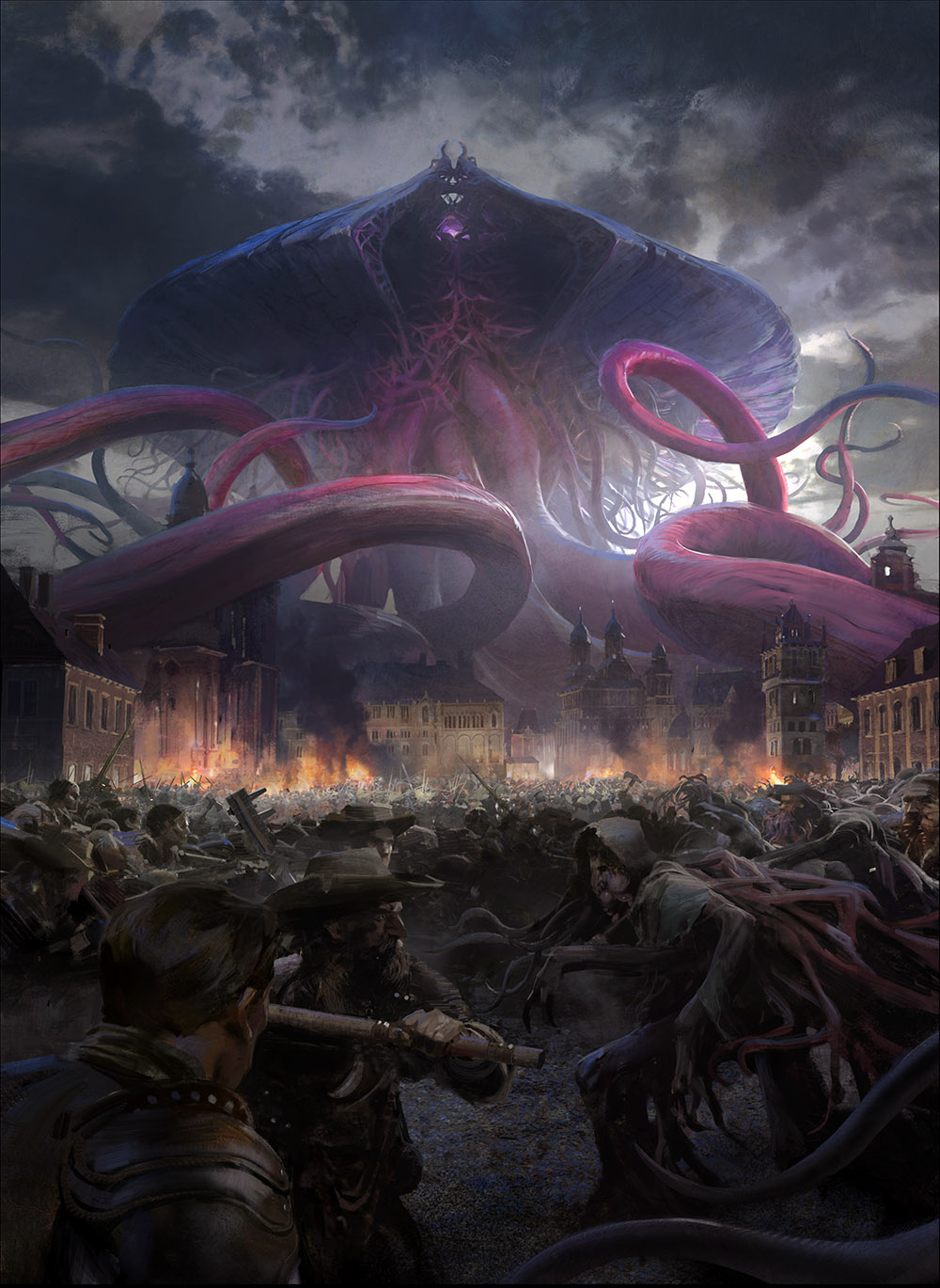

Oath of the Beyond Spells
| Paladin Level | Spell |
|---|---|
| 3rd | bane, ray of sickness |
| 5th | alter self, levitate |
| 9th | counterspell, phantom steed |
| 13th | Evard’s black tentacles, summon aberration |
| 17th | contact other plane, insect plague |
Channel Divinity
3rd-level Oath of the Beyond feature
You gain the following Channel Divinity options. See the Sacred Oath class feature for how Channel Divinity works.
Mind Speech. You can use your Channel Divinity to form a telepathic connection with another creature. As a bonus action, you choose a creature you can see within 30 feet of you. You and the chosen creature can speak telepathically with each other for a number of hours equal to your Charisma modifier (minimum of 1 hour) regardless of distance. The creature doesn’t know it is connected to you in this way until you speak to it, and it can respond to you telepathically. You don’t need to share a language to understand each other.
When you first reveal your presence in the creature’s mind, you can sow its mind with primal fear instead of communicating with it. You end the telepathic connection and the creature must succeed on a Wisdom saving throw or be frightened of you for 1 minute. A creature frightened in this way has disadvantage on ability checks and attack rolls even if it can’t see you. It can repeat the saving throw at the end of each of its turns, ending the effect on a success.
Abjure Influence. You can use your Channel Divinity to expel any outside influence from your mind. If you are charmed or frightened, you can use your action to stop being charmed or frightened. As part of the same action, you can make one melee weapon attack against the creature that inflicted you with this condition if you are within range.
Aura of the Extraplanar
7th-level Oath of the Beyond feature
You emit a distorting aura. The first time an attacker makes an attack roll against you, it must roll with disadvantage. Creatures of your choice within 10 feet of you also gain this benefit as long as you aren’t incapacitated. An attacker is immune to this effect if it doesn't rely on sight, as with blindsight, or can see through illusions, as with truesight.
At 18th level, the range of this aura increases to 30 feet.
Power From Beyond
15th-level Oath of the Beyond feature
You use your connection to the beyond to draw on its power. You can choose to cast one spell of 4th level or lower from the warlock spell list without expending a spell slot or material components. This counts as a paladin spell for you. At 17th level, you can choose a spell of 5th level or lower.
Once you use this feature, you can’t use it again until you finish a long rest.
Indescribable Form
20th-level Oath of the Beyond feature
You take on the form of the mysterious unknown entity. As an action, you gain the following benefits for 1 minute:
- You are invisible.
- Creatures within 30 feet of you have disadvantage on saving throws against your Oath Spells and Channel Divinity options, unless they are Aberrations.
- When a creature first enters within 30 feet of and can see you, it must make a Wisdom saving throw against your spell save DC. On a failed save, the target takes 3d6 psychic damage and is frightened of you until the start of its next turn, as it is assaulted by the horrors of your eldritch form. A creature frightened in this way has disadvantage on ability checks and attack rolls even if it can’t see you. On a successful save, it takes half damage and no other effects occur. You can choose any number of creatures to be immune to this effect.
Once you use this feature, you can't use it again until you finish a long rest.
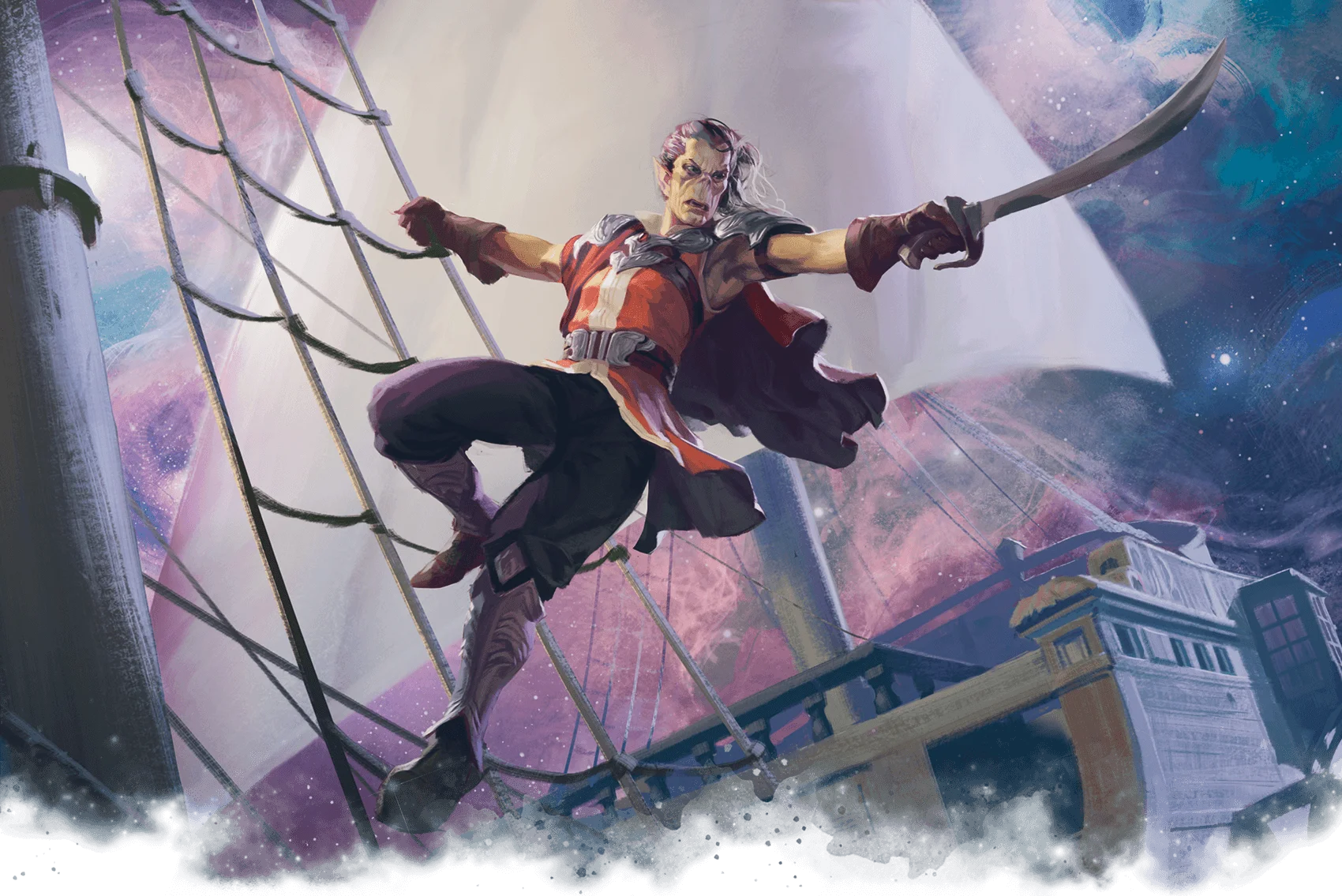


Ranger: Astral Walker
The Astral Walker is a ranger that traverses the time-frozen Astral Plane. Thought to have only been found amongst the ranks of the githyanki, the opening of the multiverse as well as increasing popularity of Wildspace adventuring has caused many to take up this archetype.
Rangers who spend much of their time in the Astral Sea take advantage of the absence of time to further develop their skills. During this time, they also develop psionic powers from repeated exposure and gain a natural resistance to the harsh psychic winds that often blow in this empty, silvery plane.
Astral Walker Magic
3rd-level Astral Walker feature
You learn the mage hand cantrip if you haven’t already. When you cast this cantrip, the hand is invisible.
You also learn an additional spell of 1st level or higher when you reach certain levels in this class, as shown in the Astral Walker Spells table. Each spell counts as a ranger spell for you, but it doesn't count against the number of ranger spells you know.
Astral Walker Spells
| Ranger Level | Spell |
|---|---|
| 3rd | mage armour |
| 5th | blur |
| 9th | haste |
| 13th | staggering smite |
| 17th | telekinesis |
Telekinetic Attack
3rd-level Astral Walker feature
Your telekinetic ability allows you to blast others with your mind. You can cast mage hand as a bonus action, and you can use a bonus action to control the hand, instead of an action. As part of the same bonus action used to cast the spell, you can make a melee weapon attack with the hand if it is within 5 feet of a creature, dealing psychic damage equal to 1d8 + your Strength modifier. Whenever you take the Attack action, you can choose to make an attack yourself or using the hand.
When a creature that you can see within 5 feet of the hand moves at least 5 feet away from it, you can use your reaction to make an opportunity attack against that creature as if you were in the hand’s space.
Time Bound Mastery
3rd-level Astral Walker feature
You have spent the infinite time in the Astral Plane further honing your talents. You choose one skill you are proficient in and double your proficiency bonus whenever you make an ability check with it. The skill you choose must be one that isn't already benefiting from a feature, such as Expertise, that doubles your proficiency bonus.
Resistant Mind
7th-level Astral Walker feature
Your psionic abilities have allowed you to mentally protect your state of mind. You gain resistance to psychic damage, and have advantage on saving throws against being charmed or frightened. If you already have resistance to psychic damage from another source, you become immune to psychic damage instead.
Psionic Leap
11th-level Astral Walker feature
You close the distance with your foes using your psionic powers. When you hit a creature with an attack from the hand, you can teleport to an unoccupied space you can see within 5 feet of the target. You then have advantage on the next weapon attack made against the same target before the end of your next turn.
In addition, the range of your mage hand is now 60 feet. You can move the hand up to 60 feet when you control it and it vanishes if it is more than 60 feet away from you.
Telekinetic Block
15th-level Astral Walker feature
Your psionic powers are strong enough to deflect attacks. When a creature you can see within 5 feet of your mage hand makes an attack, you can use your reaction to have the creature roll with disadvantage. If the attack still hits, the target of the attack takes half damage.
You can use this feature a number of times equal to your proficiency bonus, and you regain all expended uses when you finish a long rest.
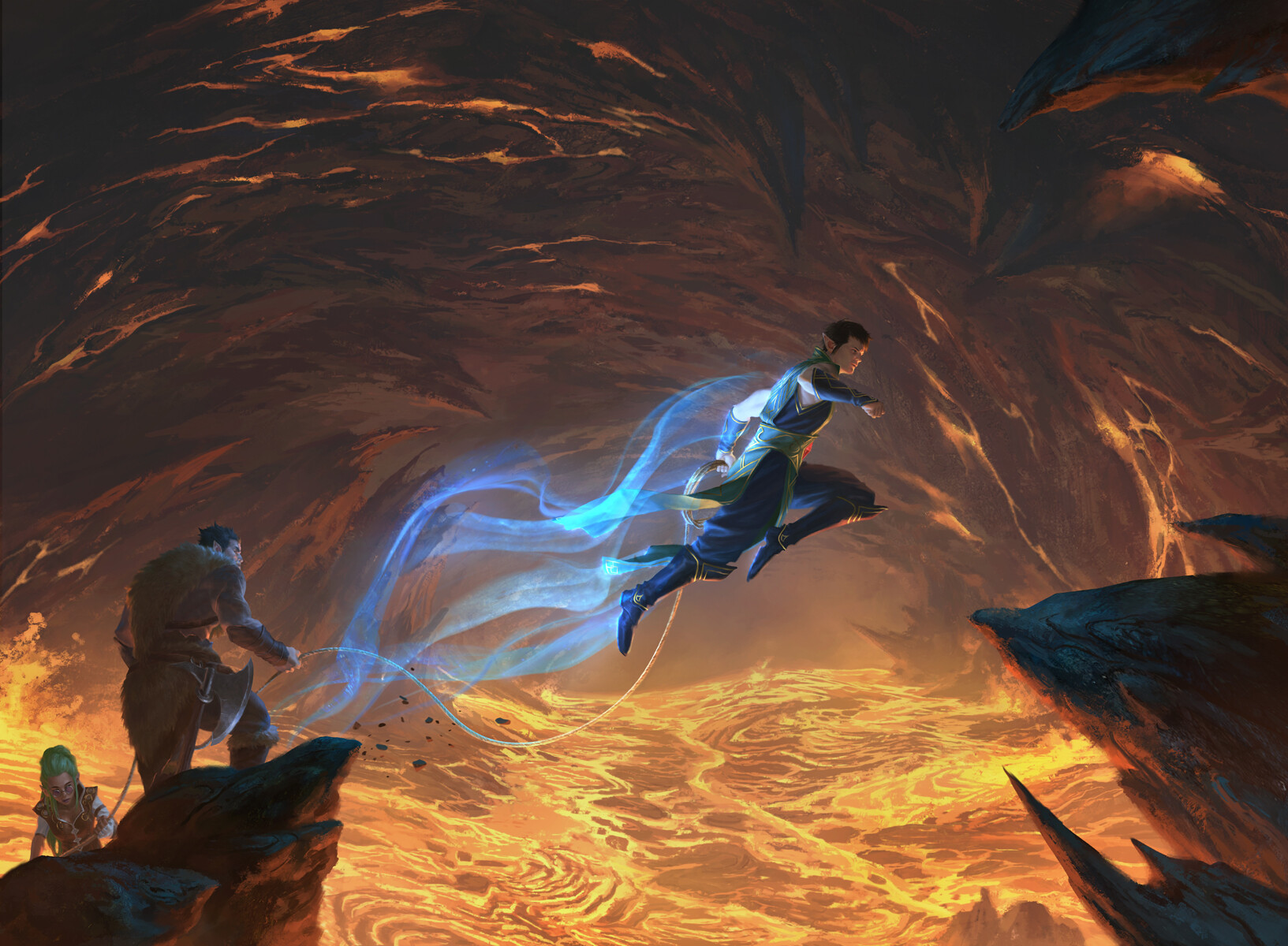


Rogue: Quicksaver
A Quicksaver is able to control their internal state of time and space in short bursts. Using this power, they can escape from tricky situations by transporting themselves into a previous moment in space, react more quickly than others, and even bring themselves back to a healthier state at a previous point in time if they are critically injured.
Personal Reversal
3rd-level Quicksaver feature
You are able to rewind your internal state of time. As a bonus action, you can mark down a personal moment in time known as a reference point. You note down your current hit points and temporary hit points, the space you are currently occupying, remaining nonmagical weapons or ammunition, and other nonmagical items you are carrying. You are considered to be concentrating when you use this bonus action.
Before the end of your next turn, you can use a bonus action to return to your reference point. You can’t return to your reference point whilst on a different plane of existence to your reference point. If another creature is occupying the same space as the one in your reference space, you are safely shunted to the closest space within 5 feet of it. Any nonmagical items that you are no longer carrying when you made your reference point also return to you.
The reference point lasts until the end of your next turn or until you use a bonus action to make a new one. Once you’ve returned to your reference point, you can’t do so again until you finish a long rest.
Process Spike
3rd-level Quicksaver feature
You slow your mind’s internal time to recall more information. Whenever you make an Intelligence (History) check, treat a roll of 7 or lower on the d20 as an 8.
Rapid Redo
3rd-level Quicksaver feature
You selectively undo less than ideal outcomes. Whenever you roll your Sneak Attack dice, you can choose any number of dice and reroll them. You must use the new rolls.
You can use this feature a number of times equal to your Intelligence modifier (minimum of once), and you regain spent uses when you finish a long rest.
Quick Load
9th-level Quicksaver feature
You’re able to leap forward in time in a short burst. When you roll for initiative, you can forgo rolling a d20 and instead roll your Sneak Attack dice instead. You must choose to do this before making the initiative roll.
Once you use this feature, you must finish a long rest before you can do so again.
Extended Rewind
13th-level Quicksaver feature
Your quicksaving abilities allow you to pull back to further points in time. When you use your Personal Reversal feature, you can now maintain concentration to keep your reference point for up to 1 minute.
When you create a reference point and then return to it after the end of your next turn, you also become incapacitated until the end of your next turn. While you are incapacitated in this way, you also have a speed of 0.
Temporal Exertion
17th-level Quicksaver feature
You speed up your own internal time outward. When you use a bonus action to create a reference point, you can also cast the haste spell as part of the same bonus action. You are concentrating on maintaining both your reference point and the spell when you cast in this way. Once you cast the spell in this way, you must finish 1d4 long rests before you can do so again.
If you return to your reference point, the spell immediately ends and each creature within 10 feet of the space you just left must also make a Constitution saving throw (DC equal to 8 + your proficiency bonus + your Intelligence modifier), as your time collapses in on itself. On a failed save, you roll half your Sneak Attack dice and a target takes force damage equal to the number rolled. On a successful save, it takes half damage.
When you successfully return to your reference point in this way, you gain one level of exhaustion, which can only be removed by finishing a long rest.
Sorcerer: Astral Soul
Your innate magic comes from the Astral Plane, the time-frozen space between planes. You might have obtained your magic abilities during a tumultuous plane hopping event, where the plane's psychic winds almost tore your mind asunder. Or you may be able to trace back your lineage to a long-time resident of the Astral Plane, such as the githyanki, inheriting their psionic abilities in the form of magic.
Astral Magic
1st-level Astral Soul feature
You learn additional spells when you reach certain levels in this class, as shown on the Astral Spells table. Each of these spells counts as a sorcerer spell for you, but it doesn't count against the number of sorcerer spells you know.
Whenever you gain a sorcerer level, you can replace one spell you gained from this feature with another spell of the same level (except astral projection). The new spell must be a conjuration or illusion spell from the sorcerer, warlock, or wizard spell list.
Astral Spells
| Sorcerer Level | Spell |
|---|---|
| 1st | detect magic, fog cloud |
| 3rd | blur, misty step |
| 5th | blink, slow |
| 7th | banishment, dimension door |
| 9th | passwall, wall of force |
| 17th | astral projection |
Planar Deflection
1st-level Astral Soul feature
You are able to phase your body in between planes to avoid the brunt of attacks. When you are damaged by an attack or harmful spell, you can use your reaction to give yourself resistance to that damage type until the start of your next turn.
Once you use this feature, you must finish a long rest before you can use it again.
Astral Affinity
6th-level Astral Soul feature
Your ties to the Astral Plane allow you to draw from its magic more easily. When you cast a spell from your Astral Magic feature and use a Metamagic option on it, you can reduce the sorcery points spent by 1 (to a minimum of 0). You can reduce the sorcery points spent number of times equal to your proficiency bonus, and you regain all expended uses when you finish a long rest.
While you are in the Astral Plane, you don’t expend any uses of this feature.
Astral Resistance
6th-level Astral Soul feature
You gain resistance to force damage and psychic damage.
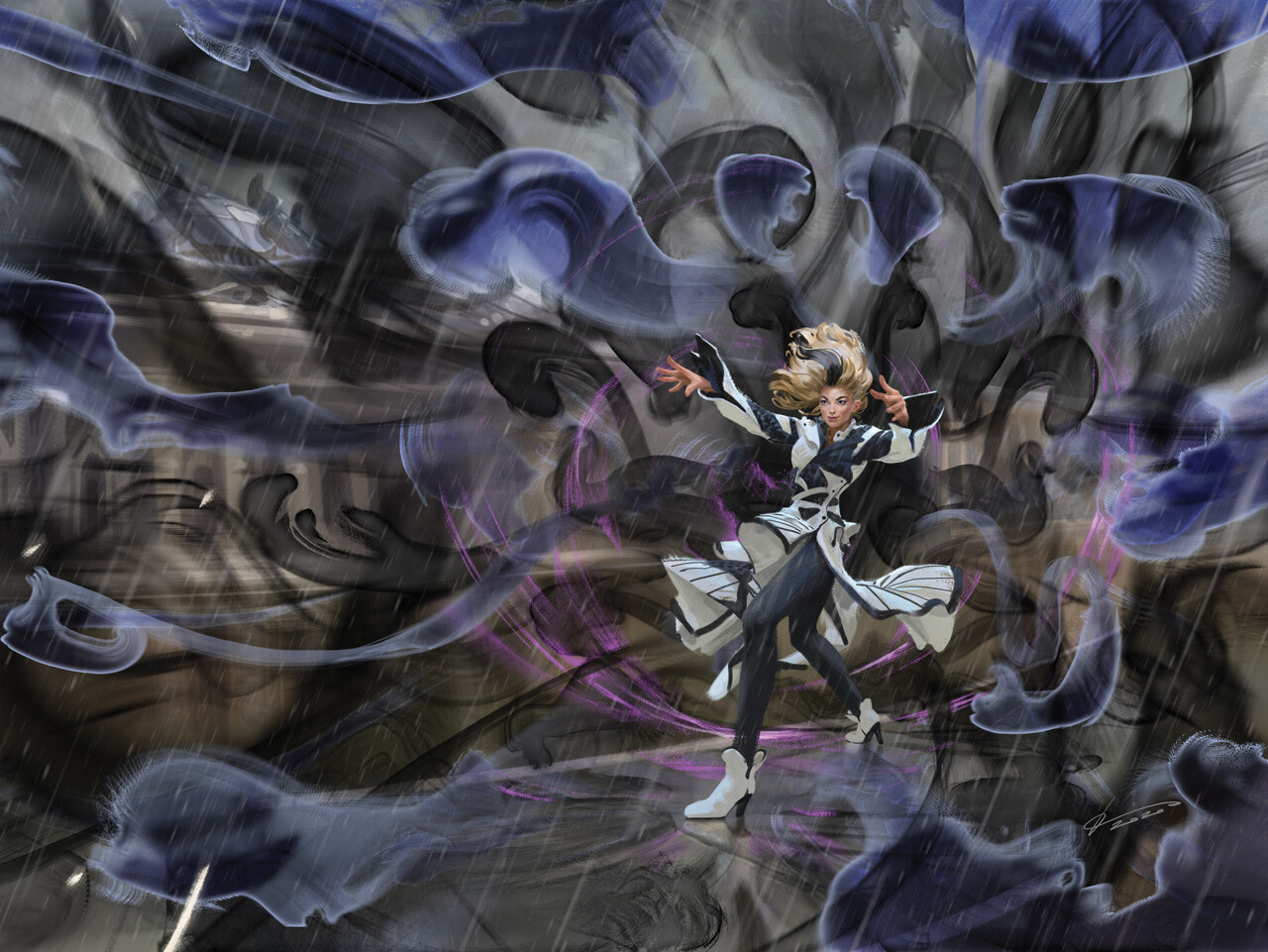

The Astral Plane
The Astral Plane is a realm that lies in between others. Any creature that uses planar teleportation, such as with a dimension door spell, or who passes through a portal into another plane, briefly travels through the Astral Plane. The plane itself is a barren, silvery void, where time comes to a standstill.
The Astral Plane is also known as the realm of thoughts and dreams, and acts as a graveyard of the gods. A deity who has died occupying the highest echelons of concepts within the sentient consciousness of all life finds its body transported here. In this desolate landscape, their bodies can be found as large, floating islands, or "god-isles", radiating a fraction of their magical energy.
Sudden Warp
14th-level Astral Soul feature
You are able to bend the space around you and others. As a bonus action, you can switch places with a creature or object that you can see within 90 feet of you, and whose size is no larger than your own. An unwilling creature must succeed on a Constitution saving throw against your spell save DC or be teleported.
Once you use this feature, you can't do so again until you finish a long rest, unless you spend 1 sorcery point to use it again.
Temporal Acceleration
18th-level Astral Soul feature
Your mastery over the Astral Plane allows you to manipulate the flow of your time. As an action, you can enter an accelerated temporal state for 1 minute. During this time, your movement speed is doubled, you have advantage on Dexterity saving throws, and you have an extra action that can only be used to take the Dash, Disengage, or Hide action. In addition, you can cast a spell as a bonus action. When you cast a spell in this way, you cannot use a Metamagic option on it.
Once you use this feature, you can't do so again until you finish a long rest, unless you spend 8 sorcery points to use it again.
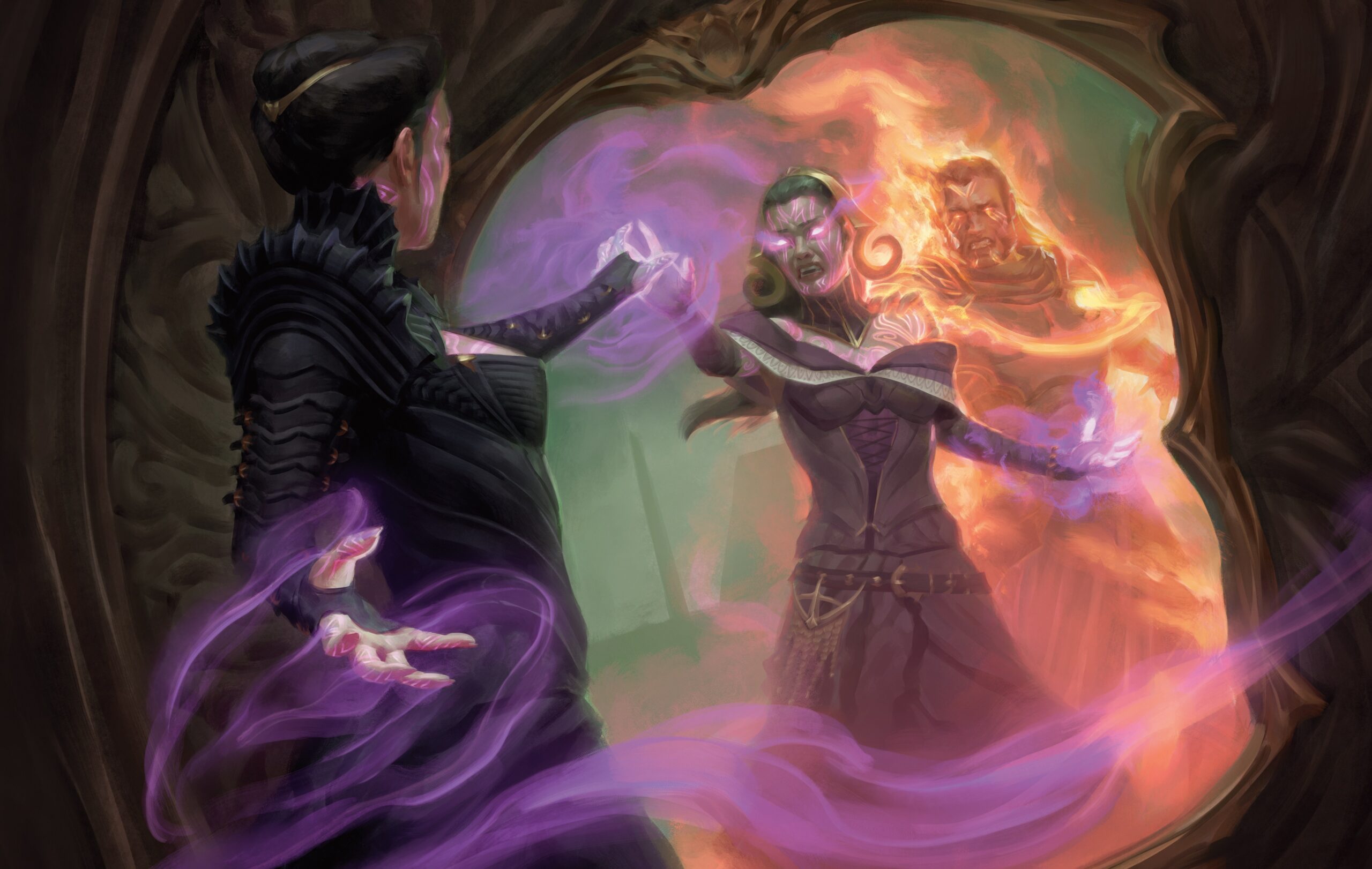


Warlock: Yourself
In an alternate universe, you are a being powerful enough to be patron to a host of warlocks. Now, you have entered a pact with your alternate self in the hopes of further achieving your own mutual ambitions.
This alternate version of you holds great power and influence. You may choose the nature of their power, or you can roll for a possible source in the Alternate Self Patron table. They could be a mortal that ascended to godhood, an archmage, or occupy some other great status.
Alternate Self Patron
d6 |
|
|---|---|
| 1 | Your alternate self is a prodigal archmage and has reached out to you through advanced multiplanar magic. |
| 2 | Your alternate self stumbled onto an ancient artifact and used it to elevate themselves to godhood. |
| 3 | Your patron amassed an obscene amount of wealth and used it to influence every facet of their world. |
| 4 | This alternate self had gotten lucky, freeing a djinni from its bindings and simply wished for power. |
| 5 | This alternate self was able to gain favour with a powerful being, such as a greatwyrm, ki-rin, or a demon lord. |
| 6 | Your alternate self stuck out during his training as a squire and became a legendary warrior that commands armies. |
Expanded Spell List
1st-level Alternate Self feature
Your Alternate Self lets you choose from an expanded list of spells when you learn a warlock spell. The Alternate Self Spells table shows the spells that are added to the warlock spell list for you, along with the spells associated in the table with your alignment.
Blessings From Yourself
1st-level Alternate Self feature
Your alternate self bestows upon you one of the following pieces of knowledge they have mastered. You gain one of the following benefits:
- You learn a cantrip of your choice from the wizard spell list. This counts as a warlock cantrip for you, but doesn’t count against the number of cantrips you know.
- You gain proficiency with medium armour, shields, and martial weapons.
- You gain proficiency in two skills of your choice from the list of skills available to warlocks at 1st level.
- You learn two languages of your choice. You also choose one skill you are proficient in and double your proficiency bonus whenever you make an ability check with it. The skill you choose must be one that isn't already benefiting from a feature, such as Expertise, that doubles your proficiency bonus.
When you reach 10th level, you can pick a different benefit from the list above.
Self Guidance
1st-level Alternate Self feature
You may discuss potential future events with your patron. Once before the end of your next short or long rest, you can spend 10 minutes communicating with your patron to determine the likelihood of certain events that will happen throughout the day. At the end of the duration, you gain a parallel die, which is a d4.
Alternate Self Expanded Spells
| Spell Level | Alternate Self Spells | Good | Neutral | Evil |
|---|---|---|---|---|
| 1st | command | healing word | sleep | bane |
| 2nd | enhance ability | zone of truth | enlarge/reduce | tasha's mind whip |
| 3rd | blink | daylight | nondetection | speak with dead |
| 4th | elemental weapon | guardian of faith | wall of fire | phantasmal killer |
| 5th | commune (with your patron only) | mass cure wounds | dispel good and evil | modify memory |
When you or a creature you can see within 120 feet of you makes an ability check, attack roll, or saving throw, you can use your reaction to roll a parallel die, expending its use, and have the creature add or subtract the rolled number from its total (your choice). At 10th level, the parallel die becomes a d6.
You can only have one parallel die at a time. An unused parallel die expires when you finish a short or long rest.
Parallel Visitor
6th-level Alternate Self feature
Your patron is able to summon shades of your alternate selves to aid you in battle. As an action, you can summon an alternate self which appears in an unoccupied space you can see within 90 feet of you. The alternate self has a number of hit points equal to your warlock level and can't use this feature, but otherwise shares your statistics. It is also wielding and carrying the same equipment as you, excluding magic items. Any magic items are replaced by its nonmagical variant (such as weapons and armour).
The alternate self is loyal only to you and obeys your commands. In combat, it shares your initiative count, but it takes its turn immediately after yours. It can move and use its reaction on its own, but the only action it takes on its turn is the Dodge action, unless you take a bonus action on your turn to command it to take another action. If you are incapacitated, the alternate self can take any action of its choice, not just Dodge, with a preference to defend you.
The alternate self lasts for 1 minute, until it reaches 0 hit points, you dismiss it as an action, or until you die.
Once you use this feature, you can't do so again until you finish a long rest.
Tip Off
10th-level Alternate Self feature
You may consult your patron about future events. You learn the divination spell, which counts as a warlock spell but doesn’t count against the number of spells you know. When you cast this spell, you can only consult your patron to ask it a question. You can also cast this spell once without a spell slot or material components, and you must finish a long rest before you can do so again.
Quantum Existence
14th-level Alternate Self feature
The shade of your alternate self is considered both present and not present in your current reality. When your alternate self is within 90 feet of you and takes damage, you can choose to take the damage instead as if you are the intended target of the attack or spell.
When you fall unconscious as a result of being reduced to 0 hit points and your alternate self is within 90 feet of you, you can cause your alternate self to drop to 0 hit points. You then regain half your hit point maximum and immediately rise to your feet.
If your alternate self drops to 0 hit points while being within 90 feet of you, you can teleport to the space it vanished from.
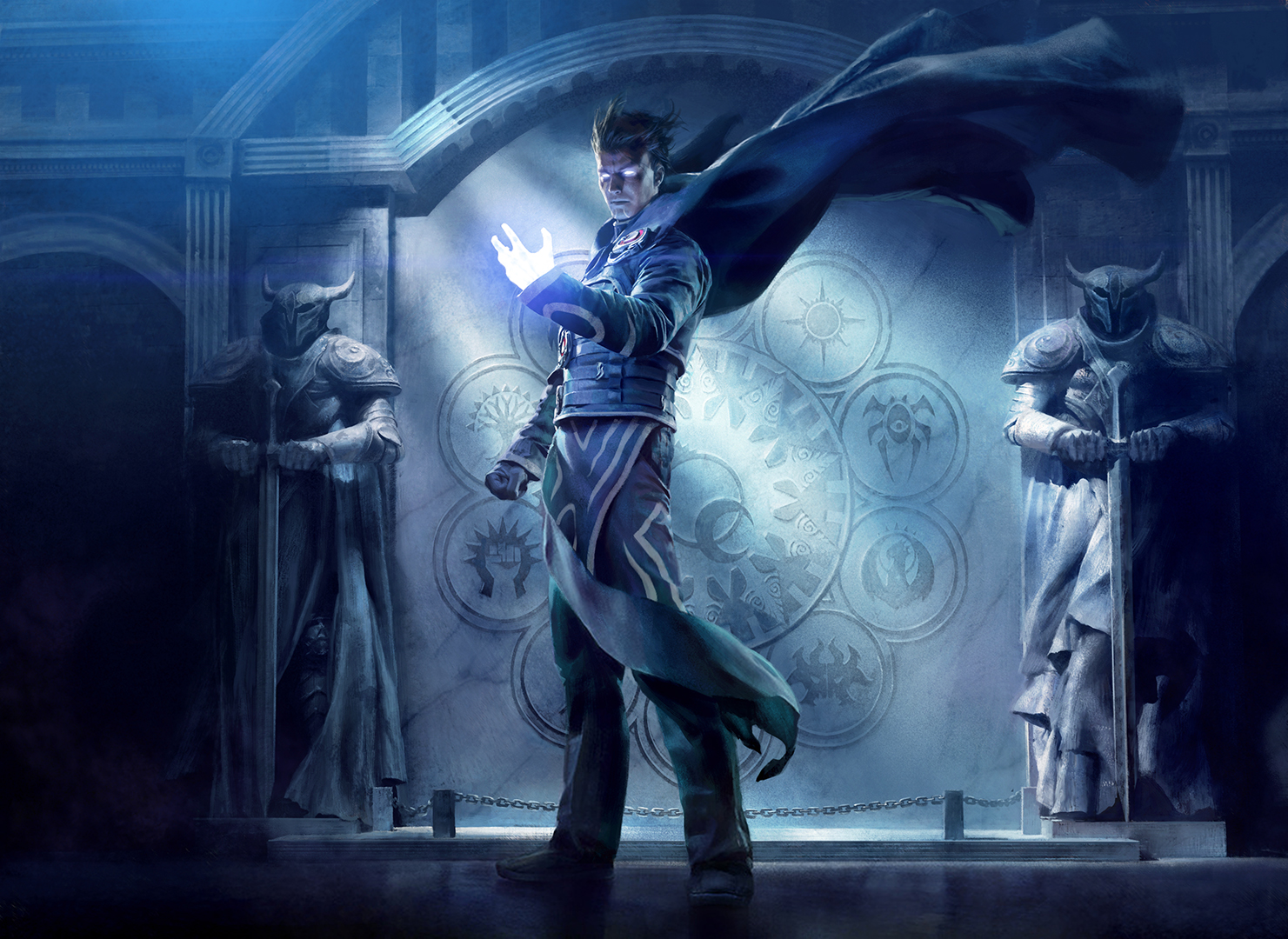


Wizard: Psionics
Wizards of the Psionics arcane tradition unlock the power of the mind in order to better cast and empower their spells. Wizards of this tradition develop psychic abilities that allow them to amplify the power of their spells and interfere with a creature's perception.
Repetitious Notation
2nd-level Psionics feature
Your study in psionics has aided in rote memorisation. The gold and time you must spend to copy a spell you already know into a spellbook is halved.
Mind Adept
2nd-level Psionics feature
As part of your study into this area of magic, you have mastered the rudimentary functions of the psychic mind and gain the following benefits:
- You know the mage hand cantrip, which doesn’t count against the number of cantrips you know, and the hand is invisible to you when you cast it.
- As a bonus action, you can choose one creature you can see within 30 feet of you. You are able to speak telepathically with each other while you are within 1 mile of each other for 1 hour or until you use this bonus action on a different creature. When you use this bonus action, you can expend a spell slot of any level to extend the distance or the length of communication you can communicate with each other for one mile or one hour per spell slot level expended, respectively.


Mental Static
6th-level Psionics feature
Your psychic abilities interfere with the minds of others. Whenever a creature makes a saving throw or a contested ability check using Intelligence or Wisdom against a spell or an effect of a spell you cast, you can roll a d4 and have the target subtract the number rolled from its total. If the spell has multiple targets, you can expend an extra use of this feature for each additional target.
You can use this feature a number of times equal to your Intelligence modifier (minimum of once) and regain expended uses at the end of a long rest.
Psionic Casting
10th-level Psionics feature
You are able to cast spells purely with your mind. You can choose to cast a spell from your spellbook that has a casting time of 1 action and is no higher than 5th-level, even if it isn't prepared, without verbal or somatic components. It also requires no material components, unless they are consumed by the spell. In addition, when you use your Mental Static feature on a spell cast in this way, you roll a d6 instead of a d4.
Once you use this feature, you can't do so again until you finish a long rest.
Psychic Backlash
14th-level Psionics feature
You cause others to experience mental whiplash using your psionic powers. When you use your Mental Static feature on a target and it succeeds on its saving throw, you can use your reaction to deal psychic damage to it. The damage equals your wizard level.
Art Credits
-
Cover Page - Portal of Sanctuary by Randy Vargas
-
Page 1 art - Scour All Possibilities by Mitchell Malloy
-
Page 2 art - Soul Transfer by DAI-XT
-
Page 4 art - Dorothea's Retribution by Marta Nael
-
Page 5 art - Time Warp by Dominik Mayer
-
Page 6 art - Famished Paladin by Tommy Arnold
-
Page 7 art - Mirror March by Johannes Voss
-
Page 8 art - Githzerai Monk by Dan Scott
-
Page 9 art - Emrakul, the Promised End by Jaime Jones
-
Page 10 art - From pg9 of Astral Adventurer's Guide by David Auden Nash
-
Page 11 art - Fly by Lie Setiawan
-
Page 12 art - Deadly Vanity by Johannes Voss
-
Page 13 art - Confront the Past by Kieran Yanner
-
Page 14 art - Jace, Living Guildpact by Chase Stone
-
Page 15 art - Watery Grave by Chris Ostrowski
-
Back Cover art - Jace, Mirror Mage by Tyler Jacobson
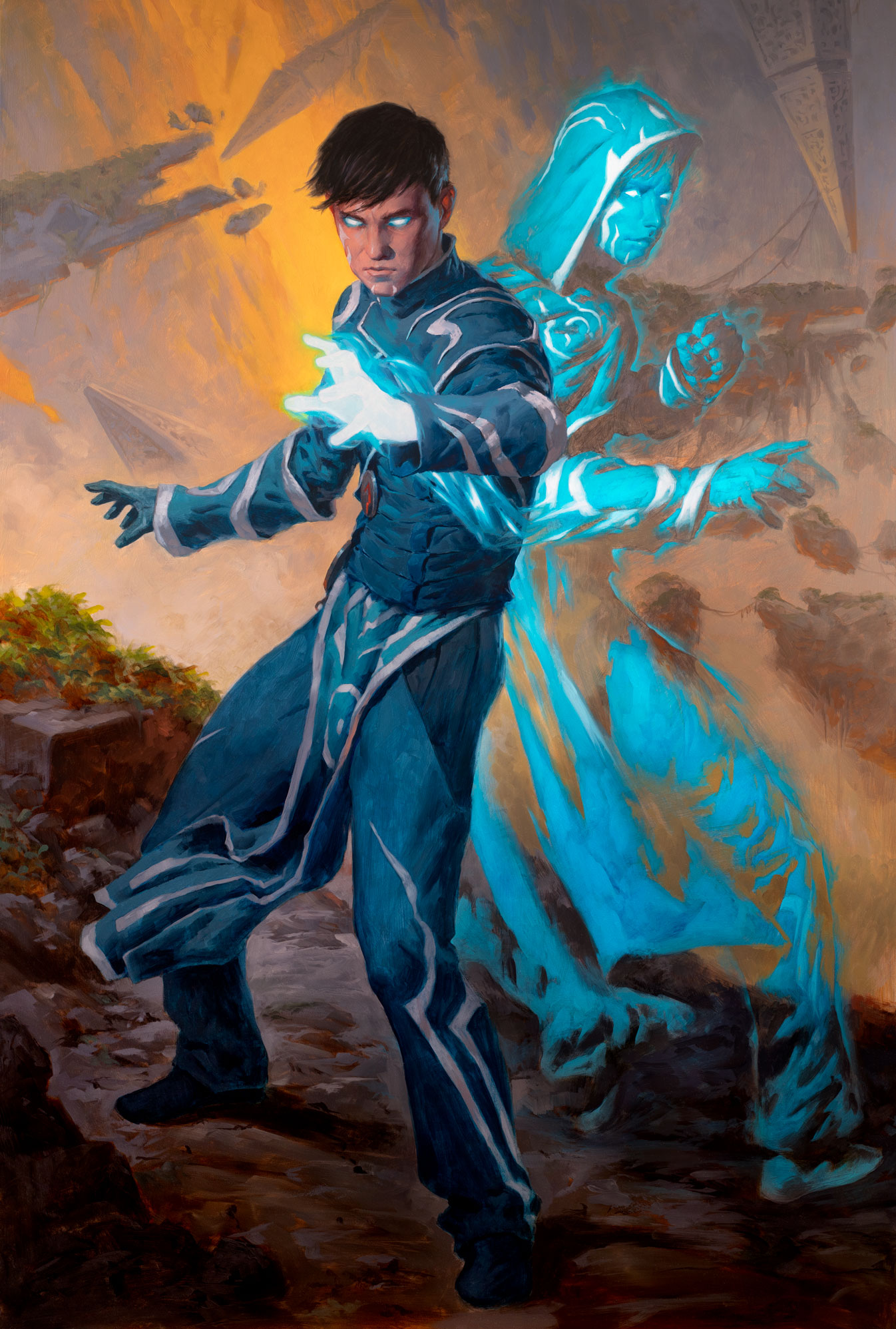
Endless
Possibilities
Await
Made by /u/Stuffies_12 (stuffies12). Created in GM Binder.
The Multiverse has opened and with them, the ability to travel to new and fantastical planes. Be transported to new worlds in the blink of an eye and meet new creatures that before only existed in your imagination. Space and time are your guide in this extraplanar journey. Are you ready to warp?
Like my work? Click the link at the bottom left to check out my other work and help support me.
Rift Maker - Path of Graviturgy
College of Heroes - Time Domain
Circle of the Horizon - Multiversal
Way of Entropy - Oath of the Beyond
Astral Walker - Quicksaver - Astral Soul
Yourself - Psionics
Disclaimer
The Multiversal Collection is unofficial Fan Content permitted under the Fan Content Policy. Not approved/endorsed by Wizards. Portions of the materials used are property of Wizards of the Coast. ©Wizards of the Coast LLC.
